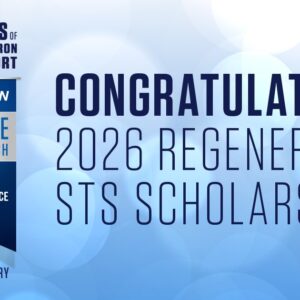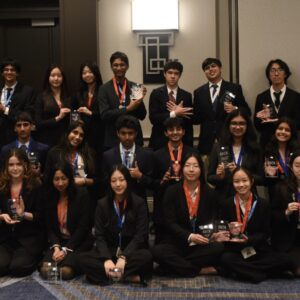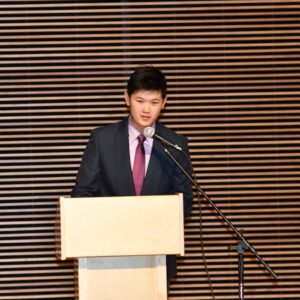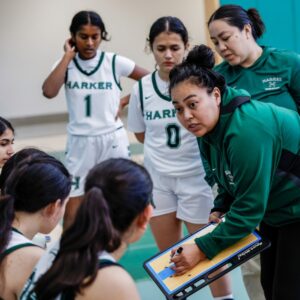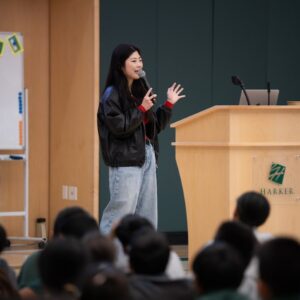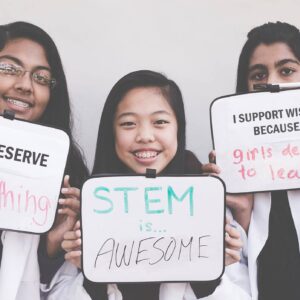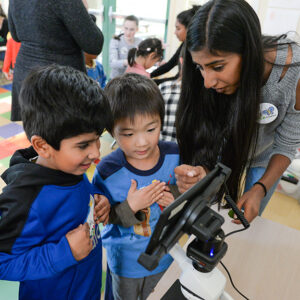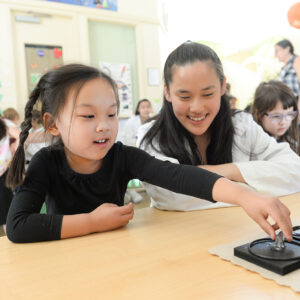Written for Harker News [Online] by Ramya Rangan, grade 11, WiSTEM Publicity Officer
This January many Harker upper school students found a new way to help the global community by raising funds to improve female education in sub-Saharan Africa.
Harker’s WiSTEM (Women in Science, Technology, Engineering and Mathematics) led a weeklong effort the first week of the new year to raise awareness about the disparity between female and male education rates in the developing world.
Throughout the week, WiSTEM members emphasized that giving a girl an education leads to better health and lifestyles for her entire family. Since female education rates are the lowest in sub-Saharan Africa, the club raised funds for CAMFED, an organization that transfers donations to Africa to send children to school.
To accomplish their goal WiSTEM members sold goods at almost every opportunity, including after school and at lunch. Unlike previous years, the goods were personalized by the club to match the week’s theme. Wristbands featured the slogan “A Chance to Advance,” and freshly-baked cupcakes were decorated with statistics about girls’ education around the world.
In the end, Harker students proved to be more than willing to support this cause. The club raised about $3,000, enough for CAMFED to “help 10 girls stay in high school in the Samfya district of Zambia. That’s 40 years of education,” said senior Josephine Chen, president of WiSTEM.
WiSTEM’s focus during their week was not just to raise money, however; the club primarily sought to increase awareness on the issue of girls’ education. As Chen explained, “While fundraising enables us to provide an immediate, direct impact on many girls’ lives, becoming educated about the cause can allow each and every one of us to continue to support the cause beyond this one week.”
To spread key statistics about girls’ education, WiSTEM gave an interactive and informative presentation during an assembly. The club also posted fliers and posters around the school.
According to Anita Chetty, science department chair and WiSTEM’s advisor, “WiSTEM used a unique way to deliver its message this year,” setting up a trivia game as a spirit competition to promote science literacy and reinforce information on [WiSTEM’s] posters.
The game was modeled after the High School Science Bowl (often called the Quiz Bowl) competition. Each class assembled a team of 10 or more student who were prepared to answer general science trivia questions and questions specific to girls’ education. With the incentive of spirit points and the need to defend class pride, approximately 50 people joined in the event in some way, either by competing or by supporting their friends.
Chetty said she “was very impressed with the number of students who came out to support WiSTEM and their classes.” Chen agreed, noting she “loved that people actually studied the various facts we posted around school” to prepare for the event. The competition served its purpose to educate the student body about the lack of girls’ education around the world.
WiSTEM members intend to continue to support increased education through the year and the club hopes to include the rest of the school in their efforts. Although the club’s week in January focused on education in the developing world, WiSTEM recognizes that education-related issues plague us locally as well.
Therefore, according to Chen, “WiSTEM is hoping to plan various activities at Scott Lane,” a school that educates underprivileged students in the Bay Area. These activities could include “tutoring, creating educational games or staging a mini-science fair.” As January fades into history, Harker students will continue to increase their impact on education levels around the world, thanks to WiSTEM’s ongoing efforts.

